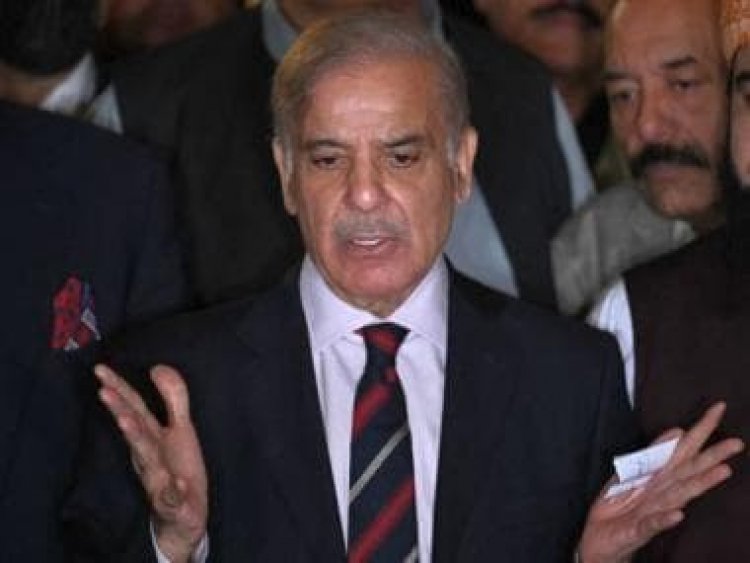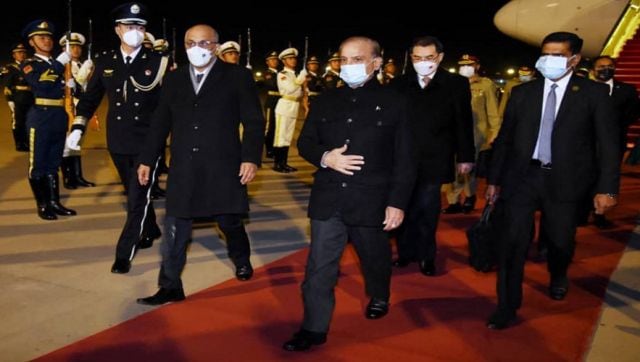Explained: Why Pakistan Prime Minister Shehbaz Sharif's visit to China is significant
Explained: Why Pakistan Prime Minister Shehbaz Sharif's visit to China is significant

Amid the political crisis at home, Pakistan Prime Minister Shehbaz Sharif began his two-day visit to China on Tuesday during which he will meet the top Chinese leadership, including President Xi Jinping, for talks aimed at boosting business and strategic all-weather ties.
Incidentally, Sharif will be the first outside leader to felicitate Xi in person for securing an unprecedented third five-year term at the recently held Communist Party Congress, becoming the first leader after party founder Mao Zedong to continue in power after 10-year tenure.
Ahead of his first visit to China since assuming office in April, Sharif also penned an op-ed in the Chinese newspaper Global Times, saying “the seed of Pakistan-China friendship has blossomed into an evergreen tree with deep roots and strong branches. It has withstood the vicissitudes of international upheavals and vagaries of domestic changes”.
#Opinion: The seed of Pakistan-China friendship has blossomed into an evergreen tree with deep roots and strong branches. It has withstood the vicissitudes of international upheavals and vagaries of domestic changes: Pakistani Prime Minister @CMShehbaz https://t.co/MRVVYmTPxu
— Global Times (@globaltimesnews) October 30, 2022
The visit is very significant for Pakistan as it struggles not only politically but also economically at home. It also comes at a time when the country is trying to salvage its ties with the United States, which soured owing to his predecessor, Imran Khan’s anti-American barrage, and accusing it for his ouster from power.
We take a look at what’s on the agenda of the Shehbaz Sharif’s visit to China and why it matters.

Financial matters and CPEC
Shehbaz Sharif hopes that his visit to China will get the Asian giant to open its purse strings to Pakistan.
Pakistan is in the midst of an economic crisis, exacerbated by the devastating floods that hit the country over the summer, causing an estimated $30 billion or more in losses.
Prior to his visit, Pakistan had indicated that it would seek debt relief to lessen its balance of payment problems, but has made no official announcement on whether it would formally ask Beijing for such help.
Shehbaz Sharif also hopes to renew the China–Pakistan Economic Corridor (CPEC) project. The CPEC was negotiated by Shehbaz Sharif’s brother Nawaz Sharif when he was prime minister from 2013-2016. It began as a $42 billion project, but was later revised to $67 billion.
However, the CPEC has hit a roadblock with the Sharif administration accusing the Imran Khan rule of “ruining the project”.
According to The Express Tribune of Pakistan, only three out of 15 projects in Gwadar, valued a little over $300 million, were completed, while 12 schemes of about $2 billion, concerning electricity and water supply and provision, remained unfinished. Sharif has resolved to galvanise work.
In his op-ed for Global Times, Shehbaz Sharif wrote that CPEC was the “central pillar of my government’s development agenda”. “Our overall aim is to harness the potential of CPEC for Pakistan’s inclusive and sustainable growth, socioeconomic development and for improving livelihoods of our people,” he wrote, emphasising the importance of the multi-billion dollar plan.
****
After China, are the US and Germany too wooing Pakistan — at India’s expense?
Pakistan risks China's ire over renewed bonhomie with US but nothing changes for India on ground
****
Killing of Chinese nationals
A big challenge for Shehbaz Sharif in Beijing will be the matter of the recent incidents of attacks on Chinese nationals in Pakistan.
In September, an attacker posing as a patient killed a man and injured two other people at a dental clinic in Karachi; all three victims were Chinese-Pakistani dual nationals and had operated the dental clinic in the area for 40 years.
In April, three Chinese language teachers and their Pakistani driver were killed in an alleged suicide bombing, also in Karachi, near the city’s Confucius Institute, which propagates Chinese language and culture.
The separatist Baloch Liberation Army — which says Chinese investment in Pakistan does not benefit locals — claimed responsibility.
However, Shehbaz has vowed to safeguard Chinese citizens in his country, writing, “Safety and security of Chinese personnel and projects in Pakistan remains our top priority. The loss of precious Chinese lives in Pakistan is our loss. We would not let anyone to damage our close friendship and strong economic partnership. My government would spare no effort to bring to justice the perpetrators of these reprehensible acts.”
A balancing act
Sharif’s visit also assumes significance amid the Russia-Ukraine war. Both China and Pakistan have in the past extended support to Russia on the matter of the war. China has steadfastly avoided criticising Russia for invading Ukraine and instead blames the United States and NATO for the war. Beijing says Washington and NATO pushed Russia into a corner with steady expansion of the transatlantic military alliance and by backing Ukraine’s drive to be a pro-Western democracy.
Pakistan, too, has supported Russia, with former Prime Minister Imran Khan visiting the country just as the war broke out and being quoted as saying that it was an “exciting time to be in Russia”.
However, the Pakistan leader will have to be mindful that he doesn’t alienate the United States while cosying up to China. Pakistan and the US have had tenuous ties in recent times owing to Imran Khan’s anti-US rhetoric.
What comes of the visit is yet unknown, but one thing is certain: India will be keeping an eye on the growing ties between the two nations, especially with China blocking India’s bid to designate Abdul Rauf Azhar, younger brother of Jaish-e-Mohammad (JeM) Masood Azhar, as global terrorist at the UN Security Council.
With inputs from agencies
Read all the Latest News, Trending News, Cricket News, Bollywood News,
India News and Entertainment News here. Follow us on Facebook, Twitter and Instagram.
What's Your Reaction?



























































